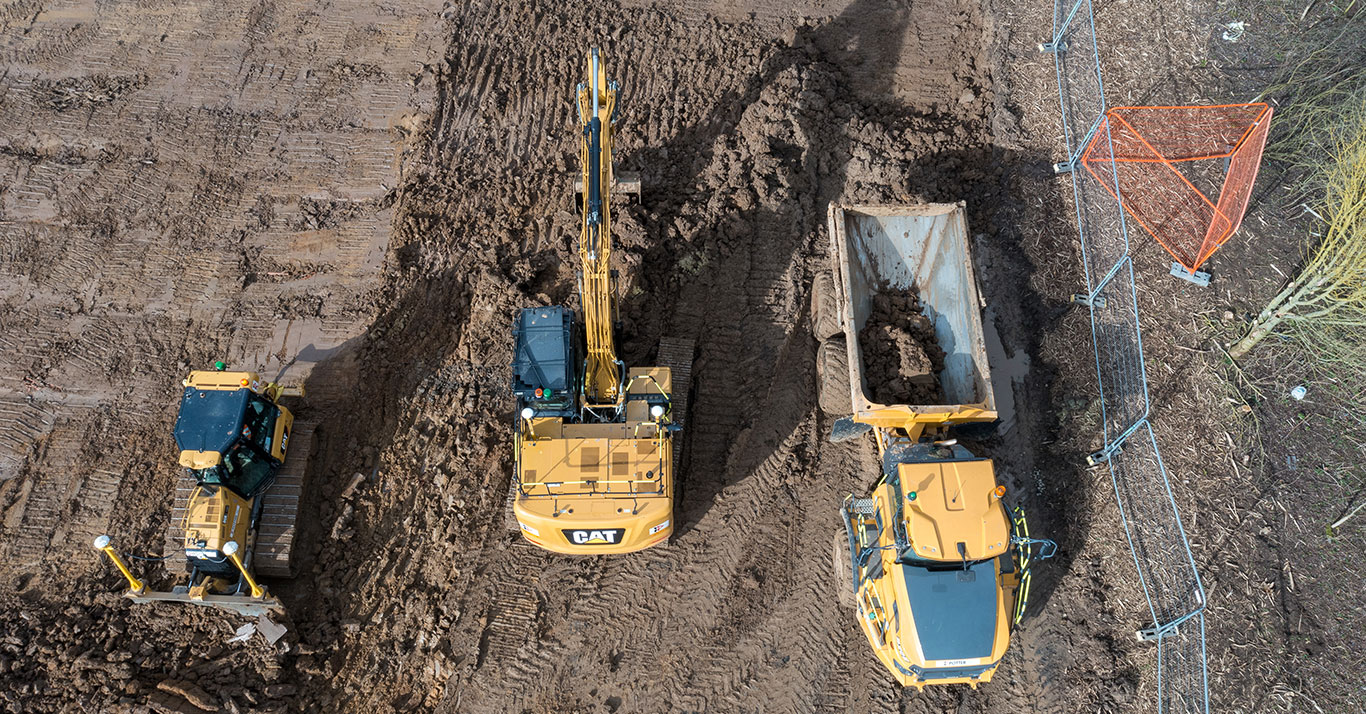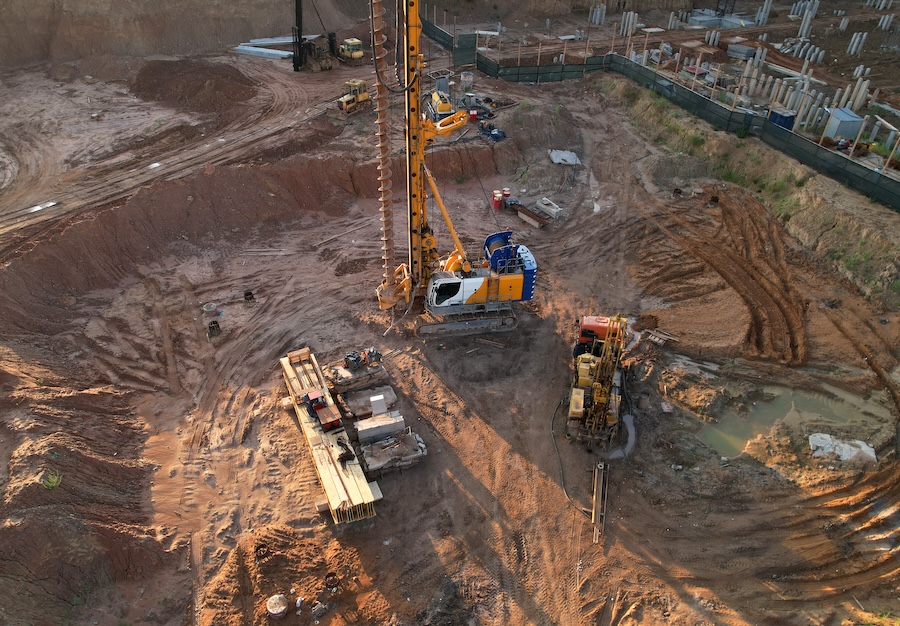How a Geotechnical Specialist Can Make Sure the Success of Your Building Foundations
How a Geotechnical Specialist Can Make Sure the Success of Your Building Foundations
Blog Article
The Relevance of Geotechnical Design in Attending To Environmental Difficulties and Enhancing Building And Construction Safety
Geotechnical design acts as a cornerstone in the intersection of ecological stewardship and construction security, giving critical insights into the behavior of soil and rock under numerous problems. This technique not just addresses pushing environmental difficulties such as dirt disintegration and groundwater defense however additionally improves the robustness of framework against all-natural threats. By implementing calculated website investigations and customized reduction actions, geotechnical engineers play a crucial duty in securing both human lives and environmental integrity. The intricacies of these difficulties elevate crucial concerns about the future direction of this field and its ramifications for lasting development.

Role of Geotechnical Design
Geotechnical design plays an essential function in the layout and building and construction of infrastructure by dealing with the actions of soil and rock products under different problems. This field of engineering is crucial for recognizing the communication in between frameworks and the ground, that includes figuring out the load-bearing capability of soil, assessing security, and forecasting possible negotiation or failing.
Geotechnical engineers are accountable for conducting site examinations, which involve sampling and testing dirt and rock to gather information on their chemical and physical residential or commercial properties. This details is vital for making structures, keeping wall surfaces, and other earth-retaining structures that make sure safety and security and durability. Geotechnical engineering notifies the selection of suitable building approaches and materials, thus minimizing threats connected with soil habits.
Additionally, the assimilation of geotechnical engineering concepts into metropolitan preparation and environmental monitoring is important for attending to obstacles such as ground contamination and groundwater administration. By comprehending geotechnical factors, designers can create lasting solutions that boost the durability of framework against natural hazards, while additionally promoting environmental stewardship. Eventually, the role of geotechnical engineering is indispensable for achieving secure, sturdy, and eco mindful building and construction practices.
Dirt Disintegration Reduction
Dirt erosion poses a substantial hazard to both environmental security and framework stability, impacting roughly 24 billion lots of fertile soil lost annually worldwide. This phenomenon is intensified by variables such as logging, urbanization, and inadequate farming methods. Geotechnical engineering plays a critical function in establishing reliable soil disintegration reduction strategies that secure both the setting and building tasks.
One approach entails the implementation of erosion control methods such as plant life planting, which maintains dirt through origin systems. Additionally, the building of keeping wall surfaces and balconies can properly minimize surface area runoff and shield prone areas from erosion. Appropriate drain layout is likewise essential; it reduces water accumulation and routes excess overflow away from essential structures.
Furthermore, geotechnical engineers employ dirt stablizing techniques, such as the application of geotextiles and biodegradable mats, to boost dirt communication and avoid degradation - all about geotechnical engineering. Normal monitoring and analysis of erosion-prone websites make it possible for timely interventions, guaranteeing long-lasting sustainability. By integrating these methods, geotechnical design not only minimizes the influences of soil erosion but additionally adds to the durability of facilities versus environmental difficulties, ultimately fostering a more secure and a lot more lasting constructed setting
Groundwater Defense Approaches
Groundwater acts as a vital resource for drinking water, farming, and commercial procedures, making its defense crucial for environmental sustainability and public health and wellness. Efficient groundwater protection techniques are vital in minimizing contamination threats and making sure the long life of this resource.

Normal surveillance of groundwater quality is additionally crucial, making it possible for very early discovery of contamination resources and helping with prompt removal initiatives. Employing sophisticated technologies, such as geophysical surveys and remote noticing, help in recognizing prospective threats to groundwater books.
Moreover, public education and learning and stakeholder interaction are crucial, cultivating community assistance for groundwater protection initiatives. all about geotechnical engineering. By integrating regulatory measures, technological advancements, and area participation, we can develop a comprehensive structure that safeguards groundwater resources while advertising lasting growth and construction techniques
Landslide Danger Monitoring
Landslides posture significant hazards to both human security and framework, making reliable threat management methods crucial. Geotechnical design plays an essential role in determining, assessing, and mitigating landslide risks. A comprehensive understanding of slope stability, soil technicians, and hydrology is essential for creating reliable risk monitoring strategies.
The initial action in landslide threat management includes extensive website examinations, that include geological mapping and soil screening. These investigations assist designers assess the capacity for landslides by identifying important elements such as incline angles, soil structure, and water web content. Using advanced technologies such as remote picking up and geophysical studies can enhance the precision of these analyses.
Once risks are recognized, ideal reduction procedures can be executed. These might consist of engineering remedies such as preserving wall surfaces, drainage systems, and slope stablizing strategies. Moreover, monitoring systems ought to be established to discover indications of ground motion and changes in water levels, enabling positive treatments.

Enhancing Building Safety And Security
Construction sites often provide a myriad of risks that can threaten worker security and job integrity. Geotechnical engineering plays a crucial duty in boosting construction safety and security by providing necessary insights into subsurface problems. Via detailed soil and rock evaluation, geotechnical engineers can determine potential threats, such as dirt instability, groundwater issues, and seismic susceptabilities, which may he said jeopardize the safety and security of building tasks.
Implementing geotechnical solutions, such as proper foundation design and the usage of preserving frameworks, minimizes these threats significantly. These services not just ensure the stability of the frameworks being constructed but additionally develop a safer working environment for construction personnel.
In addition, fostering a culture of security with training and adherence to established safety methods additionally enhances construction website safety. By integrating geotechnical competence right into the planning and execution phases, construction tasks can achieve greater safety and security criteria, ultimately securing workers and ensuring effective job completion.
Verdict
In verdict, directory geotechnical engineering serves as a critical self-control in taking on ecological difficulties and advertising building and construction security. Via effective dirt erosion mitigation, groundwater security strategies, and landslide danger monitoring, geotechnical engineers contribute to the growth of resistant infrastructure.
Geotechnical design serves as a keystone in the crossway of environmental stewardship and building safety, offering important insights right into the actions of dirt and rock under different problems. Geotechnical engineering notifies the option of appropriate building and construction methods and materials, thereby lessening dangers linked with dirt behavior.
Geotechnical engineering plays a crucial role in creating reliable dirt disintegration mitigation techniques that guard both the setting and building jobs.
Additionally, geotechnical designers use soil stablizing techniques, such as the application of geotextiles and naturally degradable floor coverings, to improve soil cohesion and avoid degradation. With detailed dirt and rock evaluation, geotechnical designers can recognize prospective threats, such as soil instability, groundwater problems, and seismic vulnerabilities, which may compromise the safety of building and construction activities.
Report this page